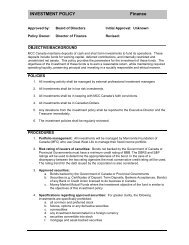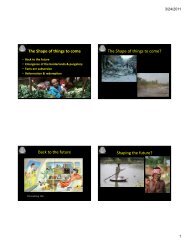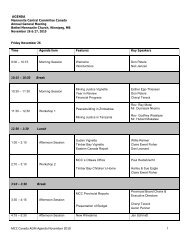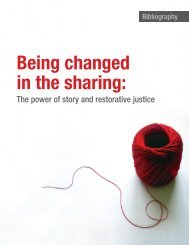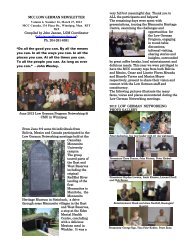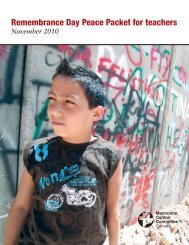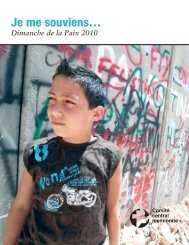Walking together: Healing and hope for Colombian refugees
Walking together: Healing and hope for Colombian refugees
Walking together: Healing and hope for Colombian refugees
You also want an ePaper? Increase the reach of your titles
YUMPU automatically turns print PDFs into web optimized ePapers that Google loves.
w a l k i n g<br />
t o g e t h e r<br />
107<br />
APPENDIX #3<br />
COMMON RESPONSES TO TRAUMATIC EVENTS<br />
Feelings Thinking What people<br />
do or say<br />
Physical Spiritual Group<br />
Behaviour<br />
fear, terror,<br />
anxiety<br />
confusion<br />
withdraw from<br />
or avoid usual<br />
activities<br />
thirst, dry<br />
mouth<br />
emptiness, loss<br />
of meaning<br />
apathy<br />
panic,<br />
paranoia<br />
nightmares<br />
panic, restless,<br />
hyper alertness,<br />
erratic<br />
movements<br />
vomiting,<br />
weakness<br />
doubt, anger<br />
at God<br />
silence, unable<br />
to talk with others<br />
anger, rage<br />
suspicious,<br />
overly sensitive<br />
emotional<br />
outbursts,<br />
suspicious of<br />
others<br />
chest pains,<br />
elevated blood<br />
pressure, rapid<br />
heart rate<br />
feeling<br />
un<strong>for</strong>given or<br />
punished<br />
denial about what<br />
is happening,<br />
unable to be<br />
truthful<br />
apprehension,<br />
depression,<br />
vengeful<br />
overly sensitive<br />
problems<br />
at work<br />
visual difficulties<br />
loss of faith in<br />
people<br />
isolate, lack of<br />
empathy, low<br />
energy <strong>and</strong><br />
productivity,<br />
inflexibility<br />
shame, guilt,<br />
sadness, grief,<br />
shock<br />
unable to<br />
concentrate<br />
or make<br />
decisions<br />
difficulty writing<br />
or talking<br />
nausea,<br />
diarrhea<br />
looking <strong>for</strong><br />
magic<br />
high rates of<br />
stress related<br />
health issues<br />
feeling<br />
helpless /<br />
<strong>hope</strong>less<br />
very critical,<br />
blaming others<br />
excessive use<br />
of humor,<br />
changes<br />
in speech<br />
patterns<br />
shallow<br />
breathing,<br />
dizziness or<br />
faintness, chills,<br />
sweating<br />
belief that we<br />
have failed God<br />
of that God is<br />
powerless, crisis<br />
of faith<br />
intergenerational<br />
transmission of<br />
pain<br />
feeling numb<br />
poor problem<br />
solving<br />
increased drug<br />
or alcohol<br />
use, domestic<br />
violence<br />
grinding teeth,<br />
headaches<br />
sudden turing<br />
to God<br />
spiritual growth<br />
<strong>and</strong> wisdom<br />
Common Responses to Traumatic Events chart courtesy of the Strategies <strong>for</strong> Trauma Resilience <strong>and</strong> Awareness Program,<br />
Eastern Mennonite University, Virginia. www.emu.edu/star ©Strategies <strong>for</strong> Trauma Resilience <strong>and</strong> Awareness Program



